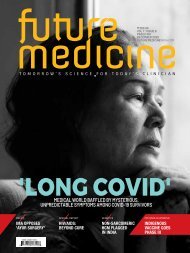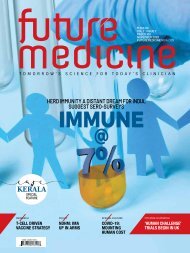FM DECEMBER 2018 ISSUE - digital edition
Create successful ePaper yourself
Turn your PDF publications into a flip-book with our unique Google optimized e-Paper software.
selective FLT3 inhibitor<br />
currently in phase 3<br />
development.<br />
The EU approval was<br />
based on results of the pivotal<br />
phase 3 QuANTUM-R study of<br />
quizartinib, which was the first<br />
randomized phase 3 study to<br />
show that an FLT3 inhibitor<br />
prolonged overall survival<br />
as an oral, single agent<br />
compared to chemotherapy<br />
in patients with relapsed/<br />
refractory FLT3-ITD AML.<br />
The median treatment<br />
duration with quizartinib was<br />
4 cycles of 28 days each<br />
versus 1 cycle in the salvage<br />
chemotherapy arm.<br />
Quizartinib is currently<br />
under regulatory review<br />
with the Japan Ministry of<br />
Health, Labour and Welfare<br />
(MHLW) for the treatment of<br />
adult patients with relapsed/<br />
refractory FLT3-ITD AML.<br />
Submission in the US remains<br />
on track for the second half of<br />
the fiscal year <strong>2018</strong>.<br />
Lorlatinib for<br />
ALK-positive<br />
NSCLC<br />
Lorlatinib (Lorbrena) has<br />
been granted US FDA<br />
approval to treat patients with<br />
ALK-positive metastatic nonsmall<br />
cell lung cancer (NSCLC),<br />
Pfizer Inc announced.<br />
Lorlatinib, a thirdgeneration<br />
anaplastic<br />
lymphoma kinase (ALK)<br />
tyrosine kinase inhibitor<br />
(TKI), is indicated for patients<br />
whose disease has progressed<br />
on crizotinib and at least<br />
one other ALK inhibitor for<br />
metastatic disease; or whose<br />
disease has progressed on<br />
alectinib or ceritinib as the<br />
first ALK inhibitor therapy for<br />
metastatic disease.<br />
This indication is approved<br />
under accelerated approval<br />
based on tumour response<br />
rate and duration of response.<br />
The approval was based<br />
on a non-randomized,<br />
dose-ranging and activityestimating,<br />
multi-cohort,<br />
multicentre phase 1/2 study,<br />
B7461001, evaluating Lorbrena<br />
CHMP gives positive<br />
opinion for dengue vac<br />
The European Medicines<br />
Agency’s Committee<br />
for Medicinal Products<br />
for Human Use (CHMP)<br />
recommended Dengvaxia,<br />
Sanofi’s dengue vaccine<br />
candidate, for approval in<br />
Europe.<br />
The indication for<br />
the dengue vaccine<br />
recommended by the CHMP<br />
is for use in the prevention<br />
of dengue disease caused<br />
by dengue virus serotypes<br />
1, 2, 3 and 4 in individuals<br />
9 to 45 years of age with<br />
prior dengue virus infection<br />
and living in endemic areas.<br />
European Commission<br />
approval of the vaccine<br />
is expected in December<br />
<strong>2018</strong>.<br />
A person can get<br />
dengue more than once<br />
as there are four distinct<br />
virus serotypes circulating<br />
worldwide. Dengue<br />
infection is unique in that<br />
a secondary infection<br />
tends to be worse than the<br />
first infection. Therefore,<br />
preventing dengue in<br />
individuals with a prior<br />
dengue infection has the<br />
potential to reduce the high<br />
human and economic costs<br />
of severe dengue.<br />
The dengue vaccine has<br />
been evaluated in studies<br />
involving more than 40,000<br />
people from 15 countries<br />
with up to six years of<br />
follow-up data from largescale<br />
clinical safety and<br />
efficacy investigations.<br />
The vaccine is currently<br />
licensed in 20 countries for<br />
the prevention of dengue.<br />
for the treatment of patients<br />
with ALK-positive metastatic<br />
NSCLC, who were previously<br />
treated with one or more ALK<br />
TKIs. A total of 215 patients<br />
with ALK-positive metastatic<br />
NSCLC were enrolled across<br />
various subgroups based on<br />
prior treatment. Among these<br />
patients, overall response rate<br />
(ORR) was 48 percent and<br />
importantly, 57 percent had<br />
previous treatment with more<br />
than one ALK TKI.<br />
Combo drug for<br />
brochodilation<br />
in EU<br />
The European Commission<br />
has authorised an<br />
expanded label for oncedaily<br />
fluticasone furoate/<br />
umeclidinium/vilanterol ‘FF/<br />
UMEC/VI’ (Trelegy Ellipta) for<br />
patients with moderate to<br />
severe chronic obstructive<br />
pulmonary disease (COPD)<br />
not adequately treated with<br />
dual bronchodilation or with<br />
an inhaled corticosteroid (ICS)<br />
and a long-acting ß2-agonist<br />
(LABA).<br />
Bronchodilation is<br />
recognised as the foundation<br />
of COPD therapy. However,<br />
many patients may continue<br />
to struggle with symptoms<br />
and exacerbations over time.<br />
The expanded indication<br />
for the triple-drug regimen<br />
reflects the evidence<br />
supporting its potential<br />
benefits in a broader group<br />
of patients than originally<br />
indicated, giving them the<br />
option of taking a once-daily<br />
36 / FUTURE MEDICINE / <strong>DECEMBER</strong> <strong>2018</strong>


















